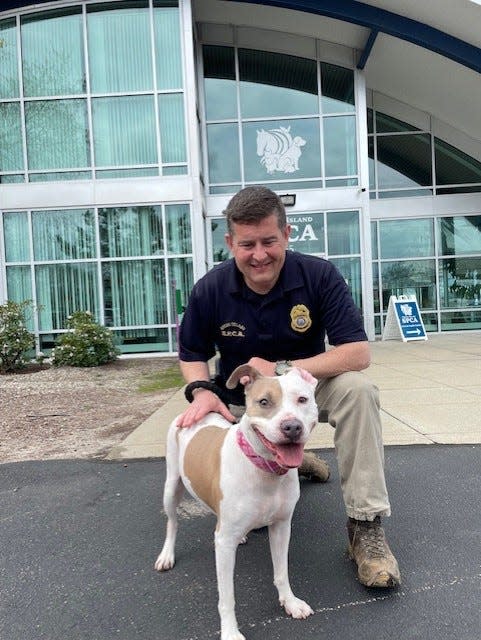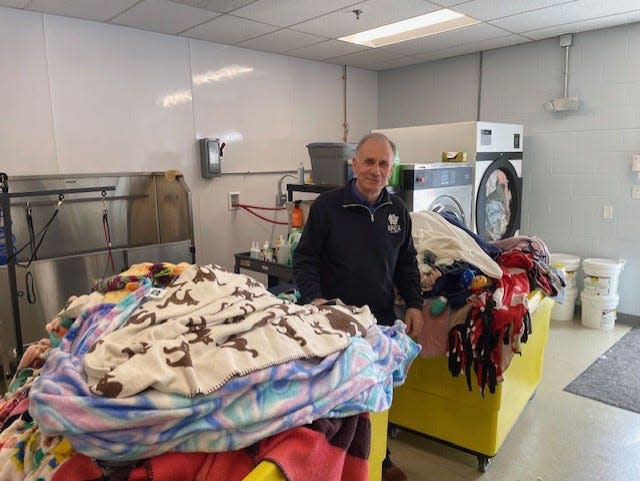'It just never ends:' Animal cruelty investigators see big increase in cases
WARWICK − A crematorium contacted the Rhode Island Society for the Prevention of Cruelty to Animals after receiving the filthy, emaciated body of a dog; a doctor called the agency after a patient asked if he could get a sexually transmitted disease from his dog; the North Providence police called after a dog's body, wrapped in a blanket, was found in the woods.
Many in Rhode Island aren't treating man's best friend, cats, rabbits, guinea pigs, or other pets very well. Above are just a few examples of the hundreds of complaints the RISPCA receives annually. The number and complexity of those calls, which must be sorted out by RISPCA's two law-enforcement officers, have increased dramatically over the past several years.
"It just never ends," said Earl Newman, a humane law enforcement special agent for the RISPCA.

When Newman started with the RISPCA eight years ago, the agency investigated an average of 75 complaints annually, but by 2022, the agency received 350 calls for service and surpassed that number in 2023. Oftentimes, the RISPCA will seize pets to keep them safe. In 2023, the agency seized more than 400 animals, a number that increased ten-fold from Newman's early years on the job.
As Newman spoke at the RISPCA's Warwick headquarters, he and Michael Longtin, the RISPCA's other special agent, had already received five complaints, with a sixth arriving during the conversation. Not all complaints result in a full investigation, pet seizures or criminal charges, but the ones that do are often time-consuming, complex and expensive.
When Newman and Longtin leave headquarters for an investigation, Wayne Kezirian, president of the RISPCA, sometimes holds his breath.
"It's not unusual for me to say, 'I hope you don't find anything. There's no more room at the inn,' " Kezirian said.
RISPCA's new headquarters filled fast
Last August, the RISPCA moved into a bigger inn, a 29,000-square-foot headquarters in Warwick, with additional space for surrendered and seized animals, as well as staff and services, but the space has filled quickly.
"We have tripled our size, and we have more than doubled our services," said Kezirian, whose agency relies on 42 staff members and about 100 volunteers. RISPCA's $2.5 million budget is funded through donations.

Animals being kept at the RISPCA include 35 dogs, among them those that have been voluntarily surrendered by owners who decided they could no longer care for them, animals taken in hoarding cases and dogs seized as part of criminal investigations, such as several allegedly used in dog fights.
If the owner in a criminal case doesn't relinquish the animal, the RISPCA must keep it until the case is resolved in court. Animal cases aren't always the highest priority in a busy court system, Newman said, and some take years to resolve. Several dogs seized in a criminal case against a dog groomer have been in the RISPCA's care for four to five years, he said.
Why have cases increased?
Why have neglect and cruelty cases increased? Newman believes several factors play a role, including the COVID pandemic, money and mental health.
Kennel shelters were essentially empty during the height of the COVID pandemic as many people worked from home, had more time on their hands and decided to get pets. Some surrendered their animals after returning to work; others simply abandoned them.
Dog breeding can also be a lucrative business, with some breeds selling for thousands of dollars, according to Newman and Longtin. A long-running campaign against pet stores has caused many legal operations to close and encouraged the growth of unregulated breeding operations.
A lucrative 'black market' for pets
"By putting a lot of those stores out of business, we've created a black market for these animals," Newman said.
"We're finding it's as profitable now to sell dogs as it is to sell drugs," he said.
Rhode Island has only about three remaining pet stores, down from about 20, Newman said. The remaining stores are still sometimes the subject of complaints, which are typically unfounded, Newman said. With the clandestine operations, greed and a lack of regulations mean the animals often pay a price.
Newman says he has also seen a significant increase in the number of "rescues" operating in the state, often importing animals from southern states. Sometimes locals are pressured to take the pets from out of state, told the animals will be euthanized if they don't, according to Newman.
Not all of the cases are as sinister as somebody running dog fights, assaulting or killing dogs, according to Newman and Longtin. In some cases, mental health may be a factor. Sometimes pet owners have good intentions, but collect more and more pets and become overwhelmed.
Newman and Longtin often find themselves considering the mental health condition of the pet owners in determining whether charges should be brought. Still, animal neglect is among the charges a well-meaning pet owner could face if a pet doesn't receive proper care.
At Longtin's desk Monday morning was a file with photographs from a house where the RISPCA had seized more than 60 cats. The floors were covered with cat feces, and Longtin wonders what impact the living conditions had on the pet owner.
Such conditions are "fairly common" in cases investigated by the RISPCA, according to Newman. Investigators and animal rescuers going inside must take health precautions. The RISPCA assisted the Pawtucket Police Department when 46 dogs were seized from a house last month. People going inside wore hazmat suits. After work, Longtin changes clothes in his garage before going inside his house.
What's happening with some recent investigations?
Cases still on the desks of Longtin and Newman include trying to solve the mystery behind the three dead dogs that have washed up separately on Barrington beaches in February, March and April.
In the case of the emaciated dog delivered to a crematorium, the RISPCA sent the dog's body for a necropsy, which indicated the dog was emaciated, dehydrated and had fur matted with feces. The RISPCA is seeking charges against the owner.
In the case of the man who asked his doctor if he could get an STD from his dog, charges were not brought, because there wasn't enough evidence. Such cases are not uncommon, according to Newman, but are difficult to prove; the victims can't talk. However, DNA evidence helped support charges in another case.
In the case of the dead dog reported in North Providence on Monday, Newman was seeking an arrest warrant Tuesday.
This article originally appeared on The Providence Journal: RISPCA's animal cruelty cases have surged. What's behind the increase?
